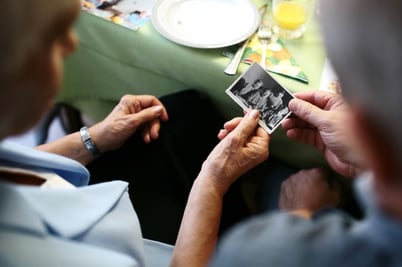How Do I Know When It's Time for Memory Care?
Candace McCarty | Sep 15, 2016
Whether your loved one has Alzheimer's or another form of dementia, or is just starting to exhibit signs of memory loss, knowing when it's time for memory care can be a big decision for your family. While there isn't an equation or checklist that fits each individual's specific circumstances, there are signs to look for, and Walker Methodist helps families transition to memory care when ready. Here are some considerations for your family.
Differing Signs of Memory Loss
 It is common to forget the little things from time to time. Who hasn't misplaced car keys or forgotten the name of a new neighbor you've just met? The Mayo Clinic points out that "some degree of memory problems, as well as a modest decline in other thinking skills, is a fairly common part of aging." However, there comes a point in time when memory loss occurring as a natural part of the aging process differs from memory loss due to Alzheimer's disease and other conditions/disorders.
It is common to forget the little things from time to time. Who hasn't misplaced car keys or forgotten the name of a new neighbor you've just met? The Mayo Clinic points out that "some degree of memory problems, as well as a modest decline in other thinking skills, is a fairly common part of aging." However, there comes a point in time when memory loss occurring as a natural part of the aging process differs from memory loss due to Alzheimer's disease and other conditions/disorders.
Memory Loss from Normal Aging
This type of memory loss covers the ideas listed above, and are often manageable without the need for a specialized environment designed for safety. For example, memory loss from aging can emerge as forgotten names or the need to make lists to keep appointments top of mind throughout the day. By in large, seniors with this type of memory loss maintain a high degree of independent living.
Memory Loss Associated with Dementia
You'll notice a significant difference between memory loss as a result of normal aging, and memory loss that occurs as a side effect of dementia. Keep in mind that dementia is an umbrella term that covers a variety of diseases/conditions with similar symptoms. This includes the impairment of memory, but also diminished capacities for reasoning and judgement.
Again, the Mayo Clinic offers insight with a list of early signs that memory loss may be associated with dementia and not normal aging:
- Asking the same questions repeatedly
- Forgetting common words when speaking
- Mixing words up — saying "bed" instead of "table," for example
- Taking longer to complete familiar tasks, such as following a recipe
- Misplacing items in inappropriate places, such as putting a wallet in a kitchen drawer
- Getting lost while walking or driving around a familiar neighborhood
- Undergoing sudden changes in mood or behavior for no apparent reason
- Becoming less able to follow directions
Signs Memory Care is Necessary
The signs listed above are key in identifying the possibility of memory loss, but there are other signs to keep an eye out for that point toward the need for memory care for your family member or loved one. There are a handful of signs to cover here, but chief among them is trouble understanding and processing visual images or spatial relationships.
For some individuals suffering from Alzheimer's, for example, issues with vision can make it not only difficult to read, but a lack of spatial cognition can also lead to issues judging distances or comprehending colors that pose a serious risk to your parent's health. This is especially true if they are still driving.
Another key sign you can look for is a withdrawal from social or work activities. Decreased interest in and self-removal from hobbies and social activities serve as a sign that your parent or loved one may be struggling to keep up or even remember how to compete in a favorite hobby or activity.
Memory Care Options
Fortunately, when your parents or loved one need memory care, there are many quality options available to help them adapt to a life hampered by memory loss and associated issues. At Walker Methodist, there are specialized memory care communities and a unique Music & Memory program designed to assist seniors.
Memory care services from Walker Methodist include 24/7 onsite specially trained staff ready to assist with the everyday clinical needs of those suffering from memory loss. All neighborhoods are designed with safety in mind, and feature an intimate home-like atmosphere. In addition, your loved one's needs are taken care of with daily housekeeping, personal laundry service, beauty and barber shops, and meal preparation services. And finally, Walker Methodist offers memory care programs that enhance overall quality of life for senior residents living with dementia. Life does not stop because of their disease - it continues each and every day, one day at a time.
Our Music & Memory program launched in 2014 to provide a better life for seniors living with memory loss. The personalized music program can help calm chaotic brain activity and help seniors be more present in the moment, simultaneously empowering them to reconnect with those around them in their memory care neighborhood and broader community.
A Certified Care Partner with Music & Memory, Walker Methodist also believes in the proven power of music to slow memory loss, increase recognition and recollection, and even improve the lifestyles of residents in general.
There's an option available for your senior family member or loved one struggling with memory loss. One of our Walker Methodist memory care communities is ready to help ensure a safe and enhanced quality of life for your loved one with a memory related disease.

